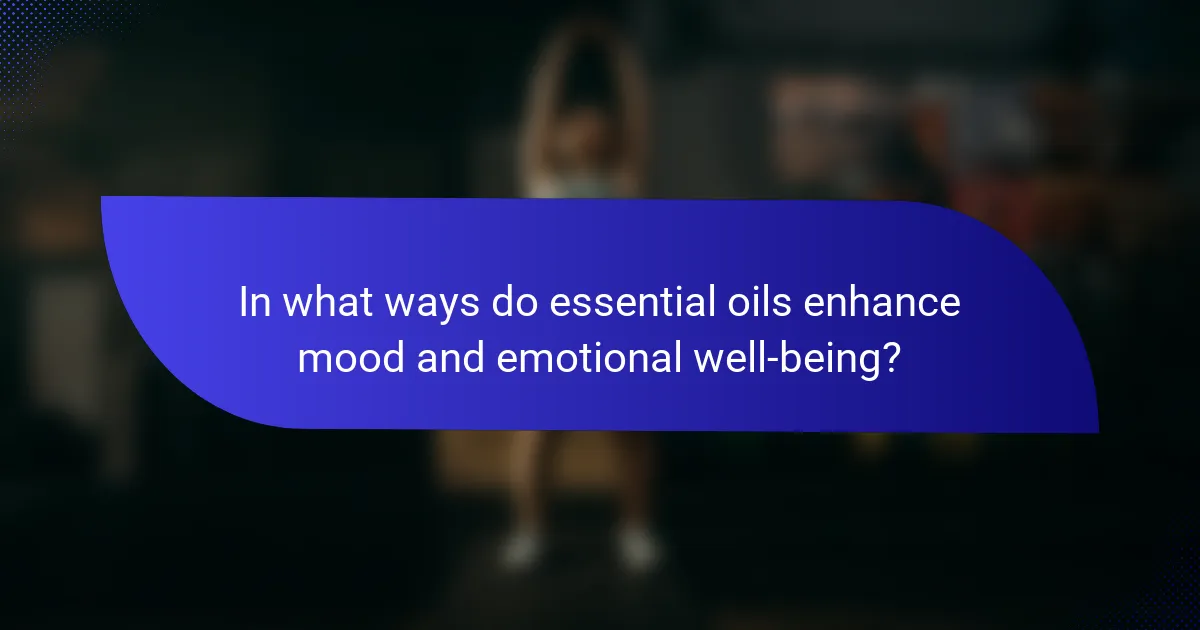Essential oils can significantly enhance relaxation, improve sleep quality, and elevate mood. These aromatic compounds interact with the brain’s emotional center, promoting calmness and reducing anxiety. Oils like lavender and chamomile are well-known for their sleep-inducing properties, while citrus oils can uplift mood. Understanding proper usage and individual responses can optimize the benefits of these essential oils.

How do essential oils promote relaxation and stress relief?
Essential oils promote relaxation and stress relief by influencing the brain’s emotional center. They interact with receptors in the olfactory system, triggering calming effects. For example, lavender oil has been shown to reduce anxiety and improve sleep quality. The unique attributes of essential oils, such as their aromatic compounds, enhance mood and create a sense of tranquility. Inhalation or topical application of these oils can lead to measurable reductions in stress levels.
Which essential oils are most effective for relaxation?
Lavender, chamomile, and bergamot are among the most effective essential oils for relaxation. Lavender oil is known for its calming properties, promoting better sleep and reducing anxiety. Chamomile oil enhances mood and aids in sleep improvement. Bergamot oil can elevate mood and alleviate stress. Other notable oils include ylang-ylang, frankincense, and sandalwood, each contributing unique benefits to relaxation and emotional well-being.
What methods can be used to apply essential oils for stress relief?
Essential oils can be applied for stress relief through several effective methods. Inhalation is a popular technique, where users breathe in the aroma directly or use a diffuser. Topical application involves diluting essential oils with a carrier oil and massaging them into the skin, which can enhance relaxation. Bathing with essential oils added to warm water offers a soothing experience. Lastly, adding oils to a pillow or sleep mask can promote better sleep and mood enhancement.
How do individual preferences affect the choice of essential oils?
Individual preferences significantly influence the choice of essential oils for relaxation, sleep improvement, and mood enhancement. Factors such as personal scent affinity, emotional responses, and past experiences shape these preferences.
For instance, lavender is widely favored for its calming effects, while citrus oils like bergamot may be chosen for their uplifting qualities. Unique attributes like individual sensitivities to certain scents also play a crucial role.
Additionally, the context of use, such as whether oils are applied topically or diffused, can affect preference. As a result, understanding these preferences helps in selecting the most effective essential oils for personal well-being.

How can essential oils improve sleep quality?
Essential oils can significantly improve sleep quality by promoting relaxation and reducing anxiety. Oils like lavender and chamomile are known for their calming properties, which help create a peaceful environment conducive to sleep. Studies show that inhaling these scents can lower heart rate and blood pressure, enhancing overall sleep quality. Additionally, incorporating essential oils into bedtime routines, such as through diffusers or topical applications, can establish a soothing atmosphere, making it easier to fall asleep and stay asleep.
What are the best essential oils for enhancing sleep?
Lavender, chamomile, and bergamot are the best essential oils for enhancing sleep. Lavender oil is well-known for its calming properties, which can reduce anxiety and improve sleep quality. Chamomile oil promotes relaxation and has mild sedative effects, making it beneficial for sleep. Bergamot oil can help reduce stress and elevate mood, contributing to a more restful night. Other notable oils include ylang-ylang and cedarwood, which can also enhance sleep by fostering a tranquil environment.
How do different application methods impact sleep improvement?
Different application methods can significantly influence the effectiveness of essential oils for sleep improvement. Inhalation through diffusers or direct inhalation provides immediate effects, while topical application may offer prolonged benefits due to skin absorption.
For example, lavender essential oil, when diffused, can create a calming atmosphere, promoting relaxation. In contrast, applying chamomile oil to pulse points can enhance its sedative properties, providing a unique attribute of personalized use.
Moreover, the duration of exposure plays a role; longer diffusion times can lead to a more sustained impact on sleep quality. As a result, selecting the right method based on individual preferences can optimize sleep improvement outcomes.
What role do sleep environment and routine play with essential oils?
Sleep environment and routine significantly enhance the effectiveness of essential oils for relaxation and sleep improvement. A calm, dark, and cool atmosphere optimizes the benefits of oils like lavender and chamomile. Consistent sleep routines reinforce the calming effects of these oils, promoting better sleep quality. Integrating essential oils into a nightly ritual can signal to the body that it’s time to wind down, enhancing overall mood and relaxation.

In what ways do essential oils enhance mood and emotional well-being?
Essential oils enhance mood and emotional well-being through their aromatic properties that influence the brain’s limbic system. These oils can reduce stress, promote relaxation, and improve sleep quality. For example, lavender oil is known for its calming effects, while citrus oils like lemon and orange can uplift mood. Inhaling these scents can trigger positive emotional responses, making essential oils a valuable tool for mental wellness.
Which essential oils are linked to mood enhancement?
Lavender, bergamot, and ylang-ylang are essential oils linked to mood enhancement. Lavender oil reduces anxiety and promotes relaxation. Bergamot oil uplifts mood and alleviates stress. Ylang-ylang oil decreases tension and enhances emotional well-being. These oils can be used in diffusers, baths, or topical applications for effective mood improvement.
How do essential oils interact with mood disorders?
Essential oils can positively influence mood disorders by promoting relaxation and enhancing emotional well-being. Research indicates that certain oils, like lavender and bergamot, reduce anxiety and improve mood. Aromatherapy using these oils can trigger physiological responses, leading to decreased stress levels and improved sleep quality. The unique properties of essential oils, such as their ability to engage with the limbic system, further support their effectiveness in mood enhancement. Regular use may provide a natural complement to traditional therapies for mood disorders.
What are the psychological mechanisms behind mood enhancement with essential oils?
Essential oils enhance mood through olfactory stimulation and biochemical responses. Inhalation triggers brain regions linked to emotions, such as the amygdala. For instance, lavender oil may reduce anxiety and promote relaxation, while citrus oils can boost energy and improve mood. These effects stem from unique compounds in essential oils that interact with neurotransmitters, influencing serotonin and dopamine levels. As a result, essential oils serve as natural tools for mood enhancement and emotional well-being.

What are the safety considerations when using essential oils?
When using essential oils, safety considerations include proper dilution, avoiding sensitive areas, and checking for allergies. Essential oils can cause skin irritation if used undiluted. Always perform a patch test before widespread application. Pregnant individuals and those with certain health conditions should consult a healthcare professional before use. Additionally, some oils may interact with medications, so it’s essential to research or seek guidance. Proper storage away from heat and sunlight prolongs the oils’ shelf life and maintains their efficacy.
How can users avoid adverse reactions to essential oils?
To avoid adverse reactions to essential oils, users should conduct a patch test and consult a professional. Start with a diluted concentration, typically 1-2%. Monitor for any skin irritation or allergic responses. Choose high-quality oils, as impurities can trigger reactions. Store oils properly to maintain their efficacy and safety.
What guidelines should be followed for safe use of essential oils?
To use essential oils safely for relaxation, sleep improvement, and mood enhancement, follow these guidelines: dilute oils before application, perform a patch test, avoid ingestion unless directed by a professional, and store oils in a cool, dark place.
Consider using a diffuser to disperse oils in the air, ensuring proper ventilation. Pregnant individuals and those with specific health conditions should consult a healthcare provider before use. Always choose high-quality oils to maximize benefits and minimize risks.

How do essential oils vary in effectiveness across different demographics?
Essential oils can vary significantly in effectiveness based on demographic factors such as age, gender, and cultural background. For example, older adults may respond better to lavender for sleep improvement due to its calming effects. In contrast, younger individuals might prefer citrus oils like bergamot for mood enhancement. Additionally, cultural beliefs influence how essential oils are perceived and used, affecting their overall effectiveness. Research indicates that women often report higher satisfaction with essential oils for relaxation compared to men, highlighting unique responses across genders. Understanding these demographic variations can enhance the application of essential oils for relaxation, sleep, and mood enhancement.
What factors influence the efficacy of essential oils in various age groups?
The efficacy of essential oils varies across age groups due to physiological and psychological factors. Children may respond differently to lavender for sleep than adults, influenced by their developing systems. Older adults might experience altered metabolism, affecting oil absorption and effectiveness. Additionally, individual preferences and sensitivities can vary widely, impacting overall outcomes. Understanding these nuances helps optimize essential oil use for relaxation, sleep improvement, and mood enhancement across different ages.
How do cultural perceptions shape the use of essential oils for relaxation and mood?
Cultural perceptions significantly influence the use of essential oils for relaxation and mood enhancement. Different cultures associate specific scents with emotions and healing practices, shaping preferences for particular oils.
For example, in Western cultures, lavender is often linked to relaxation and sleep improvement, while in Asian traditions, sandalwood is valued for its calming properties. These cultural associations guide individuals in selecting oils that resonate with their beliefs and experiences.
Additionally, the methods of application vary across cultures, reflecting diverse rituals and practices. Some cultures emphasize aromatherapy through diffusers, while others may use topical applications or baths.
Understanding these cultural nuances can enhance the effectiveness of essential oils in promoting relaxation and improving mood, as individuals connect more deeply with scents that align with their cultural backgrounds.

What are some common misconceptions about essential oils?
Many believe essential oils are a cure-all for ailments, but this is a misconception. Essential oils can support relaxation, improve sleep, and enhance mood, but they are not substitutes for medical treatment. Some think all oils are safe for direct skin application, yet many require dilution to prevent irritation. Additionally, there is a belief that essential oils work instantly; however, their effects can vary based on individual response and method of use. Lastly, some assume that all essential oils have the same benefits, while each oil offers unique properties tailored to specific needs.
How do myths about essential oils affect user behavior?
Myths about essential oils can lead to misconceptions that affect user behavior negatively. Many people may overestimate the effectiveness of essential oils for relaxation, sleep improvement, and mood enhancement, expecting immediate results. This can result in disappointment and reduced trust in these natural remedies.
Conversely, some myths may downplay the benefits of essential oils, leading users to ignore potential advantages. For example, believing that essential oils are ineffective may prevent individuals from utilizing them for stress relief or improved sleep quality.
Additionally, misinformation about safety and usage can cause hesitation. Users may fear adverse reactions or misuse essential oils, limiting their positive experiences. Addressing these myths through education can enhance user engagement and promote a better understanding of essential oils’ true effects.
What evidence supports or refutes popular claims about essential oils?
Research supports some claims about essential oils for relaxation, sleep improvement, and mood enhancement, while others lack strong evidence. Studies indicate that lavender oil can reduce anxiety and improve sleep quality. A review found essential oils like chamomile and bergamot may enhance mood and decrease stress. However, the effectiveness varies by individual and oil type. More rigorous research is needed to confirm these benefits universally.

What best practices should users follow when incorporating essential oils into their routine?
To effectively incorporate essential oils for relaxation, sleep improvement, and mood enhancement, users should follow several best practices.
First, choose high-quality essential oils, as purity impacts effectiveness. Second, use proper dilution with a carrier oil to prevent skin irritation. Third, consider different methods of application, such as diffusion, topical use, or inhalation, depending on the desired effect. Fourth, establish a consistent routine, using oils at the same time each day to enhance their benefits. Finally, pay attention to personal responses, adjusting the oils and methods as needed to optimize results.
How can users effectively combine essential oils for maximum benefits?
Users can effectively combine essential oils by blending complementary scents to enhance relaxation, improve sleep, and elevate mood. Popular combinations include lavender with chamomile for sleep, and citrus oils like orange with peppermint for mood enhancement.
To maximize benefits, consider the following steps:
1. Identify your primary goal (relaxation, sleep, or mood enhancement).
2. Choose essential oils that align with that goal.
3. Use a carrier oil to dilute the essential oils for safe application.
4. Experiment with ratios to find the most pleasing blend.
For example, a 2:1 ratio of lavender to chamomile can create a calming effect, while a 1:1 ratio of citrus oils can invigorate the atmosphere.
What common mistakes should be avoided when using essential oils?
To avoid common mistakes when using essential oils for relaxation, sleep improvement, and mood enhancement, ensure proper dilution, avoid direct skin application, and check for allergies. Many users overlook the importance of quality, opting for low-grade oils that can be ineffective or harmful. Additionally, overuse can lead to adverse reactions, diminishing the intended benefits. Always research specific oils and their properties to maximize effectiveness.